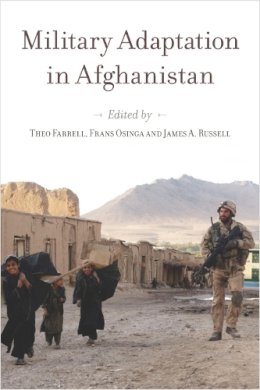
Stock image for illustration purposes only - book cover, edition or condition may vary.
Military Adaptation in Afghanistan
. Ed(S): Farrell, Theo; Osinga, Frans; Russell, James A.
FREE Delivery in Ireland
Description for Military Adaptation in Afghanistan
Editor(s): Farrell, Theo; Osinga, Frans; Russell, James A. Num Pages: 368 pages, illustrations. BIC Classification: 1FCA; 3JM; HBJF1; HBLX; HBWS4; JPS; JWK. Category: (G) General (US: Trade). Dimension: 231 x 157 x 25. Weight in Grams: 622.
When NATO took charge of the International Security Assistance Force (ISAF) for Afghanistan in 2003, ISAF conceptualized its mission largely as a stabilization and reconstruction deployment. However, as the campaign has evolved and the insurgency has proved to more resistant and capable, key operational imperatives have emerged, including military support to the civilian development effort, closer partnering with Afghan security forces, and greater military restraint. All participating militaries have adapted, to varying extents, to these campaign imperatives and pressures.
This book analyzes these initiatives and their outcomes by focusing on the experiences of three groups of militaries: those of Britain, ... Read moreCanada, Denmark, the Netherlands, and the US, which have faced the most intense operational and strategic pressures; Germany, who's troops have faced the greatest political and cultural constraints; and the Afghan National Army (ANA) and the Taliban, who have been forced to adapt to a very different sets of circumstances.
Show Less
Product Details
Publisher
Stanford University Press United States
Place of Publication
Palo Alto, United States
Shipping Time
Usually ships in 15 to 20 working days
About . Ed(S): Farrell, Theo; Osinga, Frans; Russell, James A.
Theo Farrell is Professor of War in the Modern World at King's College London. Frans Osinga is an Air Commodore in the Royal Netherlands Air Force and a Professor at the Royal Netherlands Defence Academy. James Russell is an Associate Professor at the Naval Post Graduate School, Monterey.
Reviews for Military Adaptation in Afghanistan
"Overall, this book is the rarest of breeds, an integrated anthology of experts consistently applying a well-designed analytical framework. From this broad collection of different authors, a number of clear and reasonable conclusions were drawn. The writing is crisp, detailed and informed, and the editing obviously disciplined. Both the analytical framework and its execution reveal unique insights on contemporary conflict ... Read morein general, and the character of military adaptation in complex irregular contingencies. The utility of this volume to ongoing debates about the future utility of force and the challenge of irregular warfare is evident. It will also be useful for NATO military leaders interested in gaining competitive advantage in future conflicts, and anyone seeking to avoid refighting the last war. Given the breadth of issues raised about contemporary conflict and the enormous value of the complexities of coalition warfare, this book will be valuable for interdisciplinary students, scholars of strategic studies and international students of warfare. Accordingly, it is highly endorsed and enthusiastically recommended for extended examination and follow-on studies."—Frank Hoffman, International Politics Reviews "Military Adaptation in Afghanistan provides an excellent encapsulation of the learning and adaptation that have occurred over the course of that conflict. It will serve as an excellent resource for military practitioners, historians, political scientists, and policy makers alike."—Daniel Marston, Principal, Military and Defense Studies Program, Australian Command and Staff College "In Military Adaptation and the Afghanistan War, contributing editors Theo Farrell, Frans Osinga, and James Russell have very effectively focused a select yet diverse group of expert authors to craft a coherent and timely analysis of tactical, operational, and strategic adaptation in Afghanistan. This is the first and only book that examines the war in Afghanistan through the lens of adaptation across such a range of military organizations. All security practitioners and scholars should indeed read this insightful book because it is exceedingly salient and it highlights the grave consequences of not adapting or adapting too slowly at war."—Colonel Robert Cassidy, author of War, Will, and Warlords Show Less

